On August 9th this year, at the age of 23, France international midfielder Paul Pogba became the world’s most expensive player ever. That was when English club Manchester United agreed to pay a record 105 million euros to Italian side Juventus to buy back Pogba, who had left the Mancunians for Turin four years earlier.
Meanwhile, a no less extravagent commission of 27 million euros was paid to Pogba’s agent, Mino Raiola, 47, who had demonstrated his own talent by pushing up the bidding for the promising youngster.
But the world-record transfer fee and the massive media coverage over the deal were manifestly intimidating for the young player. Pogba got off to a poor start with Manchester United at the beginning of the season, and inevitably the huge price tag of his transfer was questioned by fans and the media. In mid-September, United’s manager José Mourinho was forced onto the defensive over the sum paid by the club. “I just want Paul to forget that and to play his football,” said Mourinho.
Pogba became one of the scapegoats for the club’s disappointing results in the English Premier League, with some fans even taking to Twitter to debate his performances under the hashtags “#Pogfraud” and “#Pogshit”. The jibes have since receded as the midfielder’s form has improved through the autumn and he has at last begun hitting the net again, both for Manchester United and the France international team.
But importantly, Paul Pogba’s ups and downs on the field are set against a background of business dealings off it, marked by greed, dubious deals and tax havens. It is a story that features a ferocious battle between Oualid Tanazefti, a Frenchman who first discovered Pogba’s talent when the latter was aged just 13, and one of football’s heavyweight agents, Mino Raiola.
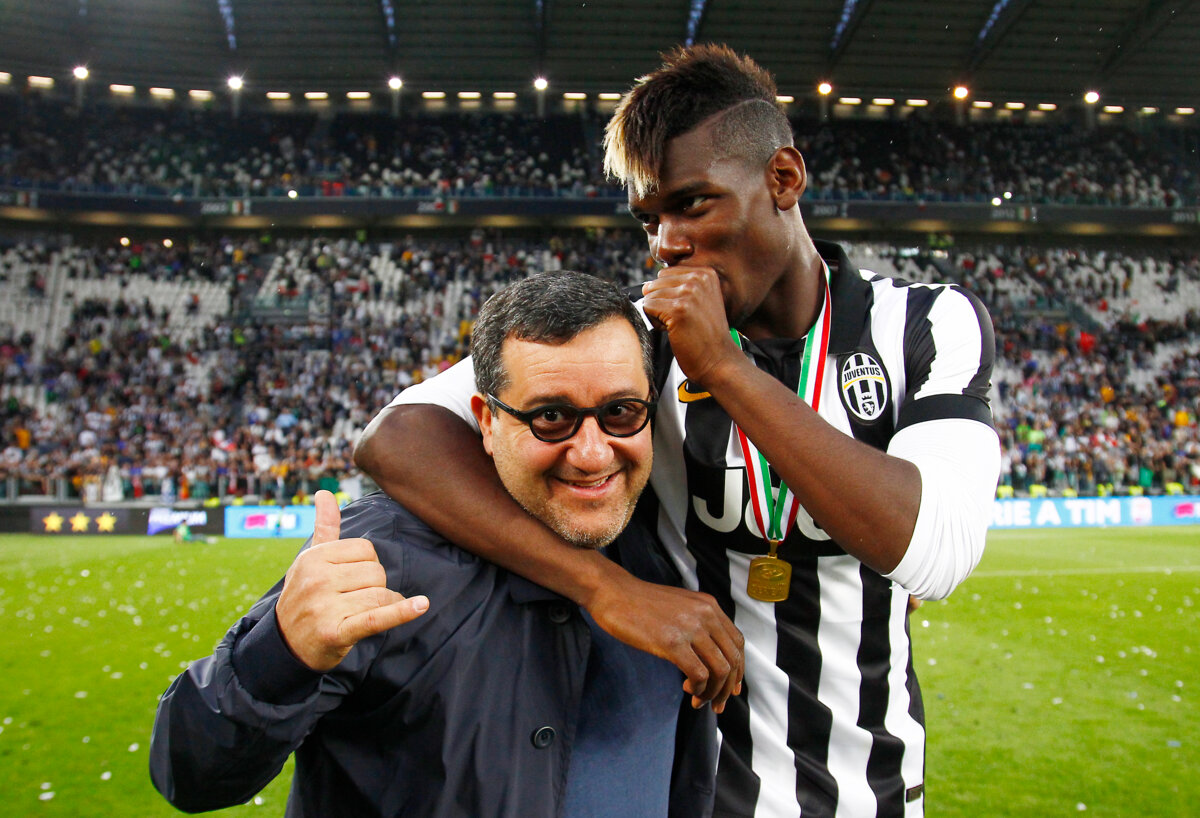
Enlargement : Illustration 1

The rivalry between Tanazefti and Raiola has already been detailed in the media, notably in reports by French sports daily L’Equipe and the investigative programme Enquêtes de Foot produced by French TV channel Canal+. But now new documents obtained by Mediapart and German weekly magazine Der Spiegel, analysed with fellow partners in the journalistic collective European Investigative Collaborations (EIC), demonstrate the vast lengths the two men were ready to go to in order to obtain rich returns from the talent of Pogba, whose own earnings have in part fructified in places where taxes are either lenient or non-existent.
Our documents also show how Paul Pogba was convinced by Tanazefti to sign a one-sided contract in 2014, which gave the agent the revenue from the player’s image rights over a period of 15 years, via a Luxembourg-based company.
Subsequently, Mino Raiola organised a buyout of the rights, when he also transferred the “Paul Pogba” brand to an offshore shell company registered in Jersey, another tax haven. That operation came shortly after Pogba had signed a major deal with sportswear company Adidas, which press reports estimate to be worth between 25-40 million euros.
The EIC investigation also shows how Mino Raiola was paid 10 million euros by Juventus during Pogba’s four years with the club, the justification for which is unclear. By adding the agent’s commission for the player’s move back to Manchester United this summer, Raiola was remunerated a total of 37 million euros by Juventus between 2012 and 2016.
Paul Pogba declined to answer the EIC’s request for an interview. His two successive agents, Tanazefti and Raiola, declined to answer our specific questions and warned that they would consider taking legal action over the publication of our investigation (see their written replies in full on page 3). Raiola said he refused to answer our questions on the basis that “amongst the information you supposedly have, some is imaginary, inexact or at any rate deformed”. Tanazefti, meanwhile, indicated that “among your questions I was able to notice that out of 34 assertions and/or interpretations, 31 assertions are totally or partially false, and/or lead from erroneous interpretations and things taken out of context”.
Oualid Tanazefi is the son of Moroccan parents who settled in France. He was born in Mantes-la-Jolie, a town with a large population of immigrant origin, about 50 kilometres west of Paris. In his teens Tanazefi had hoped to become a professional footballer. After humble beginnings playing for small clubs in Normandy, an injury he suffered at the age of 18 ended his hopes of a career on the field. He soon after became a scout for French team Le Havre, who assigned him to seek out budding young talent in small teams playing in the Paris region.
In 2006, during his scouting work, Tanazefti, then 21, came across Paul Pogba, a promising youth player aged 13. The two had similar backgrounds: Pogba, born in France to Guinean parents, grew up, like Tanazefti, in a difficult social environment, on a housing estate in the eastern Paris suburbs, the ‘Cité de la Renardière’ in Roissy-en-Brie.
Tanazefti was instrumental in Pogba’s admission to the youth training centre of Le Havre. Two years later, Pogba was called up to play in France’s national under-16 team.
In the summer of 2009, Pogba, by then aged 16 and therefore old enough to sign his first contract with a club, agreed to an exclusive youth contract deal with Le Havre. Manchester United subsequently approached the young player and Tanazefti, who was still a scout for Le Havre but had also become a self-styled advisor to Pogba, convinced Pogba to join the prestigious English club’s youth academy. Le Havre denounced the move by United, accusing it of violating an exclusivity agreement between it and Pogba, and alleging it had offered Pogba’s parents “very large sums of money” to ensure one of its “best youngsters” accepted the move. The dispute was eventually resolved in a financial deal between the two clubs which has never been detailed in public.
Tanazefti resigned from his job with Le Havre and moved with Pogba to England. “I spent three years with him in Manchester,” Tanazefti would later recall. “It was sometimes difficult because we didn’t have much money.” It was during those three years that a special relationship developed between the young Pogba, distanced from his family at the age of 16, and his “advisor” who took on a role somewhere between that of an elder brother and a substitute father. “I educated him like my son, in the same way that my father educated me,” Tanazefti told French journalists Antoine Grynbaum and Stéphane Bitton in an interview published in their book Les secrets du mercato (In English, ‘The secrets of the transfer market’).
During the summer of 2011, after Pogba had turned 18, the young Frenchman signed his first professional contract with Manchester United, which was for a 12-month period. Along with two partners, Tanazefi then set up a football agent’s business called Sporteam, based in the southern French town of Aix-en-Provence. But without an agent’s licence, and with only one football player under his wings, Tanazefi knew that he carried little weight in face of Manchester United, one of the world’s wealthiest clubs whose manager, Sir Alex Ferguson, was one of English football’s most experienced and successful. Tanazefi turned for help from Mino Raiola, already one of the world’s most influential football agents, whose list of clients included Swedish striker Zlatan Ibrahimovic and Italian striker Mario Ballotelli.
After just one year with Manchester United, and following strained relations with Ferguson, Pogba left the club for Juventus. Pogba complained that Ferguson had included him in just seven matches during the season. Ferguson, who tried to dissuade him from the move, would later, in his book of memoirs, criticise Raiola, accusing the agent of manoeuvring behind the manager’s back and seeking too much financial reward. “I did what was best for my client,” Raiola said of the events.
Raiola persuaded Juventus to pay Pogba an unusually high salary for a 19-year-old. Documents obtained from Football Leaks show that Pogba’s first contract with the Italian club gave him a gross yearly salary, bonuses included, of 2.75 million euros, which amounted to net earnings of about 1.5 million euros. According to Italian press reports, a new contract negotiated with Juventus by Raiola and signed in the summer of 2014 gave Pogba a net yearly income from the club of 4.5 million euros. That would mean that during his four seasons with the Italian club, Pogba earned a net income of 12 million euros.
Raiola was also well rewarded. Pogba left Manchester United for Juventus in 2012 on a free transfer, and the agent negotiated for himself a hefty commission, according to documents from the Italian club obtained by the EIC. These indicate that over four years, Juventus paid Raiola commissions linked to Pogba’s move amounting to 10 million euros. This was almost as much as Pogba’s reported earnings with the club. Contacted separately by the EIC, neither Raiola nor Juventus agreed to disclose what the commissions were related to.
Intriguingly, Raiola’s name was not mentioned in Pogba’s first working contract with Juventus. Instead, it is one of the agent’s collaborators, Brazilian lawyer Rafaela Pimenta, whose name appears on the deal. Yet Pimenta, who was manifestly acting on behalf of Pogba and Raiola, is officially an agent for Juventus (see an extract of the contract below).
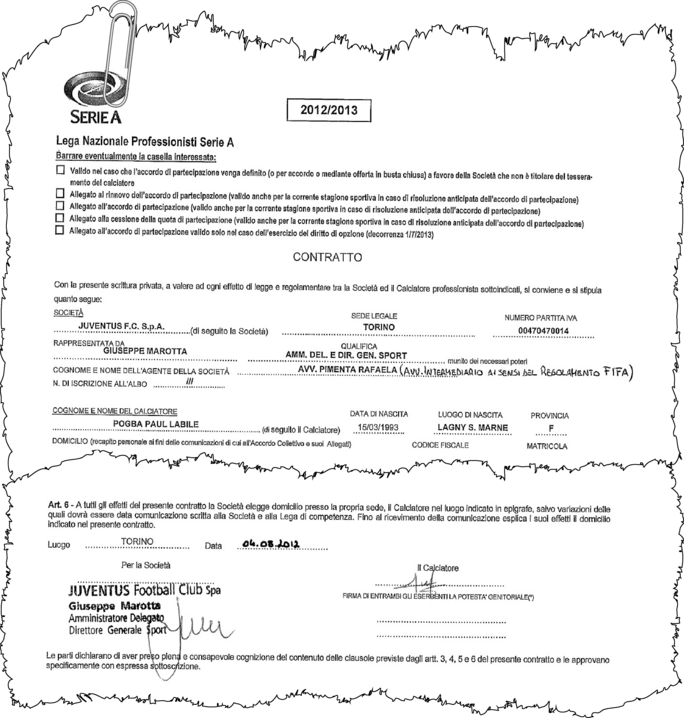
Enlargement : Illustration 2

It is unknown whether Pogba’s longstanding representative Oualid Tanazefti was aware of the lavish sums negotiated by Raiola, but the alliance formed between the two men had begun to fall apart with Pogba’s arrival in Turin, as illustrated by a telling scene filmed by Canal+ (see video below). It shows a press conference called by Juventus on August 3rd 2012 for the signing of Pogba. Alongside the player on the stand, Tanazefti asked “Mino” to join them for the photo call. Then, upon leaving the room, Tanazefti made a joke that appeared to displease Pogba. “Come on, leave him,” interjected Raiola, walking out with Pogba and addressing Tanazefti with a mocking “Ciao, ciao”.
Pogba had an official agent in the form of Raiola, and an “advisor”, who was Tanazefti. The latter sometimes appeared a little too close to Pogba when, in March 2013, the midfielder arrived at the France national team’s training base at Clairefontaine. Pogba was accompanied by Tanazefti, who was keen to look around the elite camp. He was soon escorted outside and France coach Didier Deschamps summoned Pogba to his office to tell him that there should never be a repeat of the incident.
Meanwhile, in a television interview with Sky Sport Italia in August 2013, Raiola upped the speculation surrounding Pogba: “If Bale [editor’s note: Welsh striker Gareth Bale then just bought by Real Madrid for a reported 100 million euros] is worth 100 million euros, Pogba is worth at least double that,” he said, adding that “Pogba is, for me, a Salvadore Dali”. Such a sum may appear absurd, but it was in the agent’s interest to raise the stakes. As confirmed in October by Juventus director general Giuseppe Marotta, Raiola had negotiated a major deal concerning any future transfer of Pogba from Juventus. This meant he would be paid 18 million euros in commissions if the French player was bought for 90 million euros, and more if the transfer fee went above that sum.
For Raiola, Pogba was a promising investment. After just two seasons with Juventus, the young French player’s talent and worth had blossomed. In 2013 he was part of the French national team that won the Fifa under-20s World Cup. That same year he was awarded the Golden Boy award for the best under-21 footballer in Europe. The following year, after his first major tournament with the France national senior team, in the 2014 World Cup, he was awarded Fifa’s Best Young Player title, while also winning the Italian league twice with Juventus.
His laid-back playing style, stand-out haircut and youth, not to mention what became his cult “Pogdance” display before matches, made him a huge hit with the Juventus fans. He had soon become a marketing icon, one of the rare players capable of obtaining an eight-figure contract with a sportswear company.
In 2014, Oualid Tanazefti was in difficulty. His firm Sporteam had turned into a fiasco, and he winded down the business after it had posted a turnover of just 22,000 euros in two years. Meanwhile, Pogba’s relations with Mino Raiola were ever closer, and the agent was now involved in all the negotiations with clubs.
Tanazefti had just one card left with which to make rich returns, namely image rights. In their book La bande à Deschamps (a reference to the France team managed by Didier Deschamps), French journalists Damien Degorre and Raphaël Raymond wrote that on the eve of the 2014 World Cup, Pogba was “the only French international player who had not signed a contract with a sportswear supplier because his advisor reckoned he had received no acceptable offer”. The journalists reported that he had turned down an offer from Nike worth an annual 900,000 euros. “During the World Cup, Pogba wore Nikes because he liked the look of the boots, without being remunerated,” they wrote. “The British sportswear firm Umbro, lying in ambush, offered him a contract worth 1 million euros per year. But in July 2014, nothing was yet signed.”
It is unclear whether Tanazefti eventually brokered a deal, but what is certain is that four months later he convinced Pogba to sell to him his image rights. To complete the operation, Tanazefti teamed up with one of his old associates in Sporteam, Ylli Kullashi, then aged 34. The son of a Kosovar refugee, who had arrived in France at the age of 12 and who grew up in a housing estate in the Seine-Saint-Denis département (equivalent to a county) north-east of Paris, Kullashi went on to study law and subsequently acquired a licence to act as a football agent.
The two partners bought up Pogba’s image rights, with 60% owned by Tanazefti and the remaining 40% by Kullashi. The price of the deal was to be fixed by an independent audit, and would be situated between 1.8 million euros and 5 million euros. If no audit was carried out before three months of the agreement, the price was to be 3 million euros
The payment for the rights was to be staggered over five instalments. The first of these was due in June 2015, seven months after the signature. The second instalment was never paid. The pair had handed over a maximum of 1 million euros, a sum which they were certain to swiftly recover.
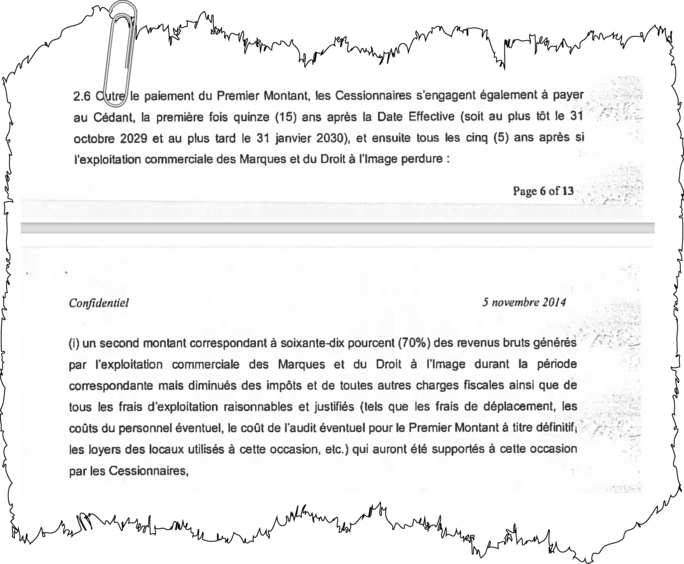
Enlargement : Illustration 4

The contract allowed for Pogba to receive 70% of the value of rights sold, while Tanazefti and Kullashi were to receive 30%. But it stipulated that Tanazefti and Kullashi would be paid their share as soon as each of the rights deals were settled, while Pogba would only begin to receive his share after 15 years, “at the earliest on October 31st 2029”. The footballer was, however, granted payment of a yearly fee that was not to exceed 33,000 euros.
During the 15 years that Pogba would receive no payment of his share in the rights deals, Tanazefti and Kullashi were free to invest the money due to him as they thought fit. They were also to receive half of any profit on the investments. Furthermore, when Pogba would finally receive his payment, in October 2029, he was bound to repay to the two men the sum they themselves paid to him to acquire the rights (between 1.8 – 5 million euros), as well as their fees and expenses for brokering image rights deals. Lastly, but not least, Tanazefti and Kullashi were allowed to sell on Pogba’s image rights without his approval, and with the condition of remaining “associates”, even with a minority status, of the new rights owner.
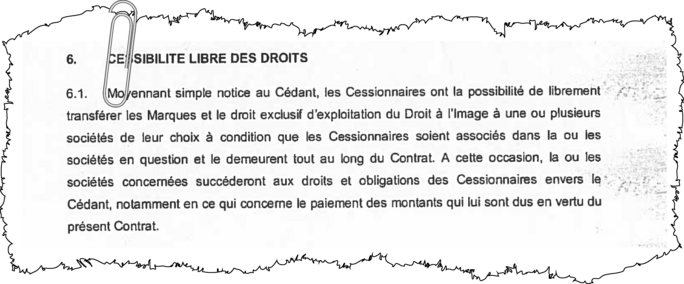
Enlargement : Illustration 5

The pair had also set up a structure to reduce their tax liability on future deals. When they were involved together in Sporteam, both were French residents, but Tanazefti subsequently adopted residency in Morocco, while Kullashi became a resident of Kosovo. While the contract with Pogba was signed in Turin, it came under Luxembourg law, and three months after the deal was struck the pair created a Luxembourg-based company called Koyot Group which was to manage the sale of the player’s image rights.
Questioned by Mediapart, Tanazefti’s written reply (see the full text bottom of page) insisted that “if, at one time or another during my career, I could have harmed or damaged the interests of those people or entities with who I have had the opportunity of working, those people would not have failed to make their rights heard in an appropriate manner”, adding: “I therefore firmly refute your insinuations aiming to place my professional probity in doubt.”
Ylli Kullashi did not respond to our attempts to interview him.
Mino Raiola soon discovered the existence of the deal, and was furious. It would appear that Paul Pogba was equally displeased because the player broke off his relations with Tanazefti in December 2014, one month after signing the contract. From then on, it was open war between Raiola and Tanazefti.
Raiola’s first counter-attack was launched in the spring of 2015. While Pogba had registered the trademark “Paul Pogba” with the European Intellectual Property Office (EUIPO), Tanazefti had omitted to inform the EUIPO that he had acquired the image rights. An Italian lawyer wrote to the EUIPO in March 2015 requesting that the “Paul Pogba” trademark be registered with an Irish company, Blue Brands Limited. The activity of the company, a shell structure which belonged to an Irish trust company, is listed as that of providing “nominee services”. This hid the true identity of the beneficiary. Pogba could not reasonably be assumed to have been unaware of the move, for he would have been required to validate the transfer to the Irish company.
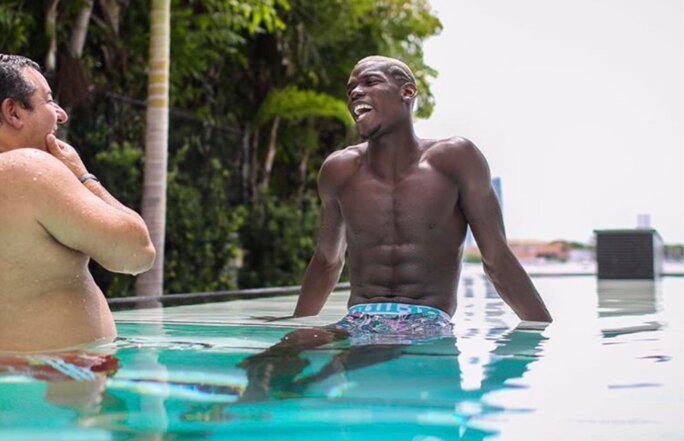
Enlargement : Illustration 6

Tanazefti attempted to contest the move, but the EUIPO refused to become involved in the dispute which it said should be settled in a court of law. The result was that Tanazefti and Kullashi could not use the trademark, but neither could Raiola. The dilemma for Pogba was that major football clubs are reluctant to sign a player who does not control his image rights, which they often make use of.
Tanazefti therefore had a powerful leverage, which he intended to use to maximum benefit. For it was because of the blockage over the image rights that Pogba was unable to leave Juventus during the transfer market in the summer of 2015, when he was sought after by several major clubs, including Barcelona, Real Madrid, Manchester City and Paris Saint-Germain. Press reports claimed that Tanazefti offered to unblock the situation in exchange for 15 million euros but that Raiola turned him down.
Documents obtained by the EIC suggest that Tanazefti then tried to sell the rights without the player’s knowledge. The documents indicate that he began by contacting a London-based investment firm, Doyen Sports, and met with its management in the British capital on November 19th 2015. During the meeting, according to the confidential information given to the EIC, a Spanish lawyer working for Doyen expressed his surprise at Tanazefti’s move: “Doesn’t Pogba work with the pizzaiolo Mino Raiola?” he asked.
Doyen Sports turned down the offer, apparently because it was worried about damaging its relations with Raiola, but also because, even if within the law, it would be very difficult to use a player’s image rights if he does not agree to it.
But Tanazefti continued with his project, approaching a British intermediary who relayed his proposition to Chinese investment group Fosun, which was initially interested, believing that Raiola was behind the deal on offer. It contacted the Portuguese “super-agent” Jorge Mendes, a leading figure in the business, to find out more. One of Mendes’s aides warned off the Chinese: “Be careful with the Pogba image rights,” the aide told Fosun in a confidential email. “The situation is very delicate, we know the case very well.” It transpired that Tanazefti had also approached Mendes.
In the business world of football, the potentially lucrative opportunities with Pogba could not remain on hold for long. On March 16th 2016, sportswear company Adidas announced it had struck a deal with the player, estimated in press reports to be worth between 25-40 million euros over ten years, including the marketing of a line of football boots carrying Pogba’s name. Two weeks later, French sports daily L’Equipe reported that the deal, brokered by Raiola, was made possible only after the agent arranged to pay Ylli Kullashi and Oualid Tanazefi a total of 10 million euros to buyout their claims to Pogba’s image rights.
The structure that Raiola created is also obscure. According to documents gained by Mediapart, the “Paul Pogba” trademark now belongs to a shell company registered in Jersey called Aftermath Limited. The offshore company is managed by a firm in the Channel island tax haven called Whitmill Nominees (see document below).
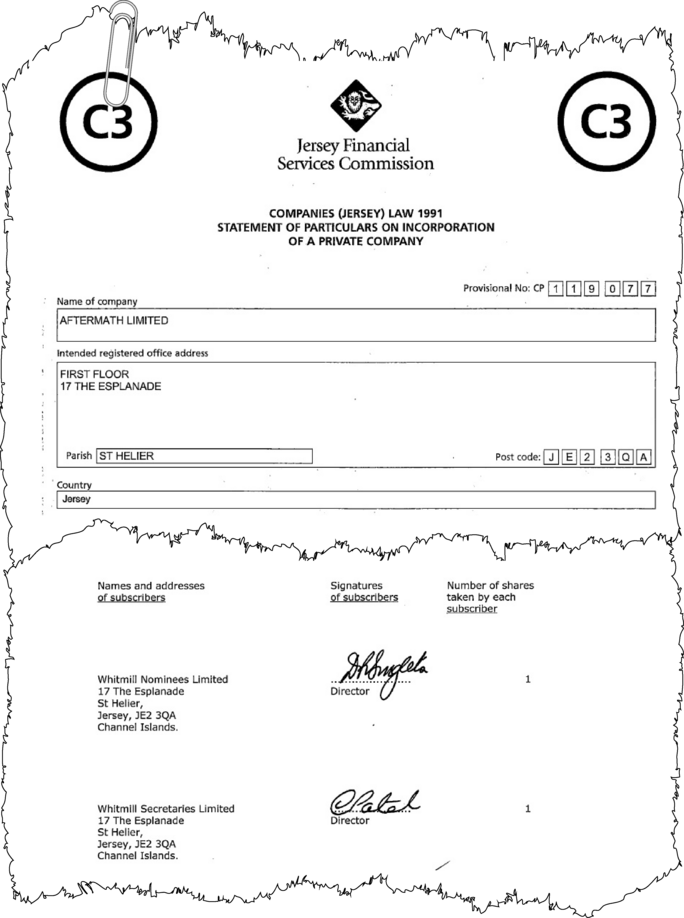
Enlargement : Illustration 7

Aftermath Limited was created on February 4th 2016, one month before the deal with Adidas was announced. At the time, the “Paul Pogba” trademark was still registered with Blue Brands, the Irish company created by Raiola during his dispute with Tanazefti. On July 15th 2016, an Italian lawyer wrote to the European Intellectual Property Office to register the transfer of the trademark to Aftermath Limited (see document below).
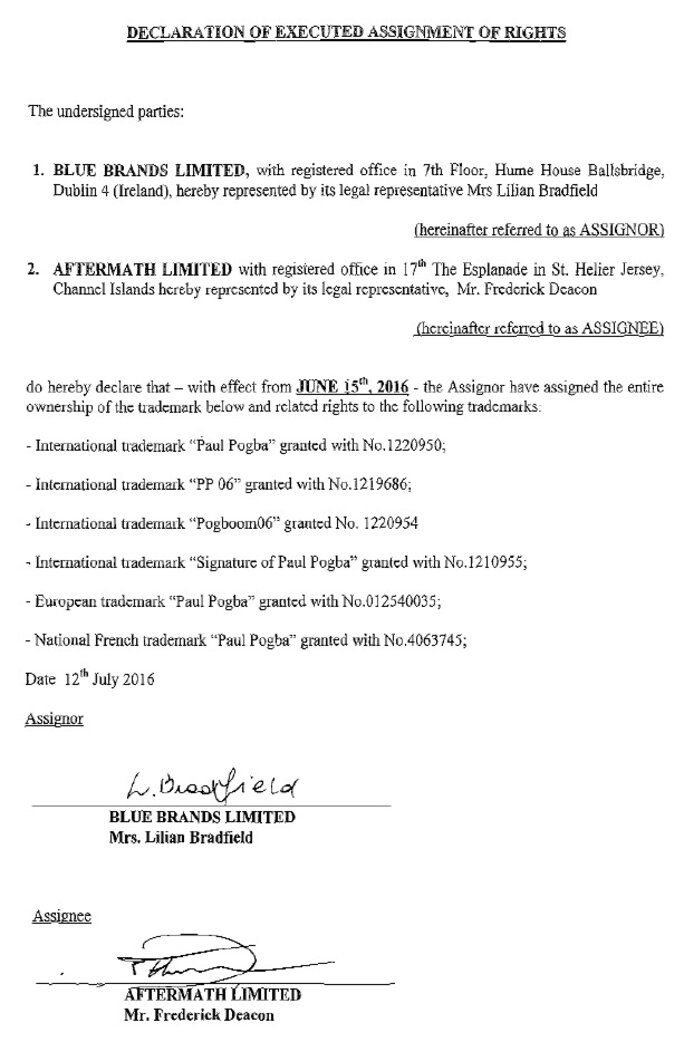
Enlargement : Illustration 8

Why did Pogba register his trademark in Jersey? Contacted via his agent, Pogba did not respond to our questions. Similarly, Mino Raiola gave no explanation about the structure in Jersey. In a written reply (see below), he described the questions put to him by Mediapart and the EIC as “tendentious and malicious”, asserting that he and Paul Pogba believe that they are part of a “campaign of denigration”, and therefore he and the player “refuse to contribute to manipulating public opinion by accrediting what you dress up in supposed investigative thoroughness”.
-------------------------
Mino Raiola was contacted by email on December 5th with a series of questions relating to the issues raised in this report. His written reply on December 7th, originally in French and translated here, was as follows:
Sir,
I am forced to react to your email dated December 5th 2016 which attempts to impose in a threatening manner on Paul POGBA, for who I am the agent, and myself, to reply to a certain number of tendentious and malicious questions.
There will be no question of accepting any interview while amongst the information you supposedly have, some is imaginary, inexact or at any rate deformed.
It clearly appears that your approach is inspired by the will to contribute to maintaining a campaign of denigration targeting Sports Agents and high-level Sportsmen in general, and more particularly Actors of Football.
We refuse to contribute to manipulating public opinion by accrediting what you dress up in supposed investigative thoroughness.
We reserve the right to take legal action of any sort against any article or statement by you that places in question the honour and reputation of the player Paul POGBA and that of myself.
Oualid Tanazefti was also contacted on December 5th by email with a series of questions relating to the issues raised in this report. His written reply on December 7th, originally in French and translated here, was as follows:
Dear Sir,
You sent to me by email dated December 5th, in your name, in the name of Mediapart and in the name of the EIC consortium, 42 questions about my professional activity, allowing me 53 hours (including sleeping time) to reply. I would like to draw your attention to the fact that I work an average of 75 hours per week and that in my agenda for this week I had not anticipated devoting the time necessary to reply to your questions.
However, among your questions I was able to notice that out of 34 assertions and/or interpretations, 31 assertions are totally or partially false, and/or lead from erroneous interpretations and things taken out of context.
In statements made by Mr. Fabrice Arfi to the French press, I was able to understand that the media organisation and the consortium which you represent is engaged in a vast project of revelations and denunciations concerning the professions in professional football.
You will understand that in these circumstances I consider that the conditions for a frank and sincere dialogue are not met.
I also notice that a part of your questions are based on certain legal documents made public since a number of months and which are accessible to any person interested in whatever manner in the subject of your article. The interpretation which you appear to make, and which comes across quite clearly in the phrasing of your questions, makes me fear that you have not taken the necessary time for analysis in order to grasp the real significance. I draw your attention to the fact that these documents have already been mentioned in the press on several occasions and you will note that they have been the subject of no comments from any of the parties concerned.
I draw your attention to the fact that during a career of 13 years in professional football I have had the opportunity of collaborating to various degrees with hundreds of professionals. I have never been implicated in whatever manner at all in any legal procedure. I have the naivety to believe that if, at one time or another during my career, I could have harmed or damaged the interests of those people or entities with who I have had the opportunity of working, those people would not have failed to make their rights heard in an appropriate manner.
I therefore firmly refute your insinuations aiming to place my professional probity in doubt.
Furthermore, I have always worked in a transparent manner and in respect of existing laws, which is why it was so easy for you to collect the information that you cite in your questions, and I leave you the entire responsibility of the interpretation of it, with the understanding that it is your professional responsibility to not relay dishonest and/or unverified claims or interpretations. My legal advisors will obviously ensure that they take the necessary measures to react to the publication of any unfounded and/or unverified allegation that is susceptible to bring prejudice to me.
Finally, in line with the code of conduct to which I have adhered over the past 13 years, I consider that the only possible star in this profession is the sportsman, which is why I have always taken care to exercise my profession away from the media. However, I would be delighted to collaborate with you within the framework of a thorough journalistic project, which would be truly interested in the manner in which my profession is exercised, and which would be based on a journalistic method that is in keeping with the ethics and deontology of your profession.
-------------------------
- Mediapart's report in French, on which this article is based, can be found here.
English version by Graham Tearse


